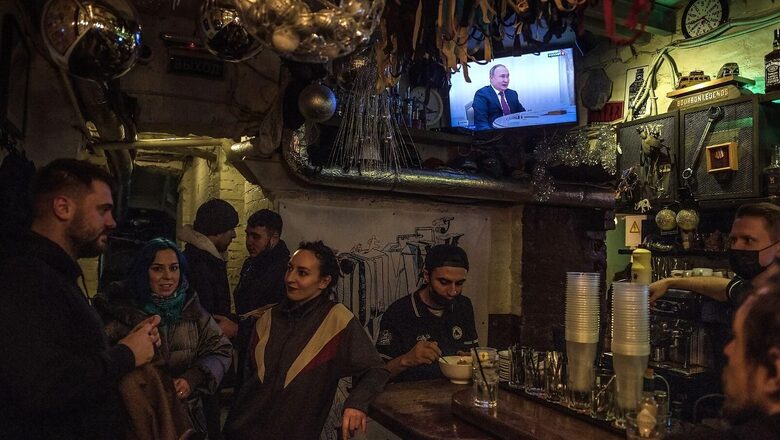
views
Waiting for her friends on Moscow’s primly landscaped Boulevard Ring, Svetlana Kozakova admitted that she’d had a sleepless night. She kept checking the news on her phone after President Vladimir Putin’s aggrieved speech to the nation that all but threatened Ukraine with war.
“Things are going to be very, very uncertain,” she said, “and, most likely, very sad.”
For months, Russians of all political stripes tuned out U.S. warnings that their country could soon invade Ukraine, dismissing them as an outlandish concoction in the West’s disinformation war with the Kremlin. But this week, after several television appearances by Putin stunned and scared some longtime observers, that sense of casual disregard has turned into a deep unease.
Pollsters say that most Russians probably support Putin’s formal recognition of the Russian-backed territories in eastern Ukraine this week, especially because they had no choice in the matter and because no significant political force inside the country has advocated against it.
But going to war is one of Russians’ greatest fears, according to the Levada Center, an independent pollster. And now that possibility has lurched closer toward becoming reality.
“This hatred that you could read in him so clearly, it wasn’t fake,” said Gleb Pavlovsky, a political analyst and former adviser to Putin, referring to the Russian leader’s angry speech and a cryptic televised meeting with his Security Council on Monday. Pavlovsky acknowledged that this week’s events had forced him to revise his skepticism that the president would go to war against Ukraine. “This is not a game,” he said.
The sense of foreboding intensified Wednesday when Moscow said that separatist leaders in eastern Ukraine had requested Putin’s help, widely viewed in the West as a fabricated justification for invasion. The Pentagon said most of Russia’s troops near the Ukraine border were combat-ready and that a full-scale attack appeared imminent.
Early Thursday, Ukraine President Volodymyr Zelenskyy made a direct appeal to the Russian people, speaking Russian in a video address posted online. He urged them to disregard Russian propaganda and do all they could to stop a war that could kill tens of thousands.
“Do Russians want war?” Zelenskyy asked at the end of his speech. “I would very much like to answer this question. But the answer depends only on you — the citizens of the Russian Federation.”
But many Russians still subscribe to the Kremlin narrative of a Russia forced to fight back against Western powers determined to destroy it. Putin’s address Monday, for all its emotion, was in tune with the grievances of many older Russians still smarting from the poverty that followed the fall of the Soviet Union and the lost prestige that accompanied it.
But for others, especially younger people, the sudden threat of war and of another downward spiral in relations with the West feel like the imminent loss of much of the freedom and opportunity that remain in Russia.
Tigran Khachaturyan, a 20-year-old history student walking his corgi named Gatsby at central Moscow’s Patriarch’s Pond, said he knew from studying the past that the worsening international tensions would lead to decline inside the country. “I’ve seen many examples of states pursuing various imperial ambitions and forgetting about the very goal of the state: the welfare of the people who live in it,” Khachaturyan said. “I don’t support this policy and view it negatively.”
And yet there is desperately little that Russians can do to change their country’s trajectory. That became even clearer after Monday’s Security Council meeting at which Putin at times browbeat and humiliated his most powerful and senior officials into telling him that he should recognize the separatist territories. The central message of this extraordinary spectacle of fealty, which the Kremlin taped, edited and aired on television, appeared to be that it was Putin alone who had the power to chart Russia’s course.
In society, opposition to this aggressive policy has been muted. The liberal-minded activists who could have been expected to lead an anti-war movement have largely been exiled or imprisoned.
This Sunday will mark the seventh anniversary of the murder in Moscow of liberal politician Boris Nemtsov, one of the loudest voices inside Russia opposing the annexation of Crimea in 2014. Opposition leader Alexei Navalny warned that Russia was about to “squander the historical chance for a normal rich life for the sake of war, dirt, lies” and Putin’s personal luxury — but Navalny was writing from prison, where he faces an additional 15-year term.
Some in the Russian public are starting to speak out. In St. Petersburg on Wednesday, one activist stood on a busy sidewalk holding up a copy of Russia’s most famous anti-war painting, “The Apotheosis of War” by Vasily Vereshchagin. The 19th-century painter had dedicated the work, showing a stack of skulls on a sun-parched field, “to all great conquerors, past, present and future.”
An online magazine, Kholod, started a social media campaign called “I’m not silent” that encouraged readers to post about why they opposed war.
“It has become impossible to ignore what has been happening in recent days,” the magazine’s editor, Taisia Bekbulatova, wrote on Facebook on Monday. “Many people say that they wake up every day with the thought that war might have broken out. This is some kind of madness.”
And one of Russia’s most popular YouTubers, journalist Yuri Dud, posted a photograph of Putin’s Security Council meeting on Instagram on Tuesday and quoted a Russian musician saying he experienced “endless feelings of shame and guilt” over what his country had done to Ukraine.
“I grew up in Russia and Russia is my homeland,” Dud wrote. “But I wish maximum support in these days to Ukraine — the homeland of my relatives and the home of my friends.”
The idea of a war with Ukraine is unfathomable to many Russians in part because millions of them have friends and relatives there. Putin’s annexation of Crimea in 2014 was popular both because so many Russians felt a personal attachment to the Soviet-era vacationland and because it was accomplished without a shot being fired.
The Kremlin has explained its support for the Russian-backed separatists in eastern Ukraine as a necessary, humanitarian intervention to aid brethren under attack by a nationalist, illegitimate government. Many Russians accept that false narrative, which is one reason more than half of those surveyed told Levada, the pollster, last year that they would support the separatist territories’ independence or their annexation to Russia.
Levada’s director, Denis Volkov, said that the center’s preliminary analysis of a survey conducted last week — before Putin made his decision to recognize the territories — also showed most Russians backing recognition or annexation. He said that support derived from the view promoted by the Kremlin that backing the separatists would help avert further bloodshed.
Many analysts say that the opposite is true, with Putin massing roughly 190,000 troops around Ukraine — according to the Pentagon — and the separatists claiming three times as much territory as their own as they currently control. Western officials say tens of thousands could be killed in a war, and that Ukrainians trying to flee to the West could create a humanitarian crisis.
But with prominent opposition voices largely silenced, there are few people left to make that case to Russians directly.
“One reason the official interpretation of this situation predominates,” Volkov said, is “because practically no significant, authoritative, independent politicians remain.”
Still, while state media trumpeted Putin’s recognition of the separatist territories with great fanfare, Russians responded with none of the spontaneous euphoria that accompanied the annexation of Crimea. Eastern Ukraine — even to those who buy the Kremlin’s narrative about persecuted ethnic Russians in need of help — holds none of the emotional symbolism that Crimea did.
In central Moscow this week, Alexei Ivanov, 53, who works in a construction company, reflected that even the Crimea annexation had made him “neither richer nor happier.” Ever since, he said, it has felt like Russia’s leadership runs the country focused on their own goals.
“They want something, they have some plans,” he said. “Common people don’t fully get their true intentions.”
Anton Troianovski c.2022 The New York Times Company
This article originally appeared in The New York Times.
Read the Latest News and Breaking News here














Comments
0 comment